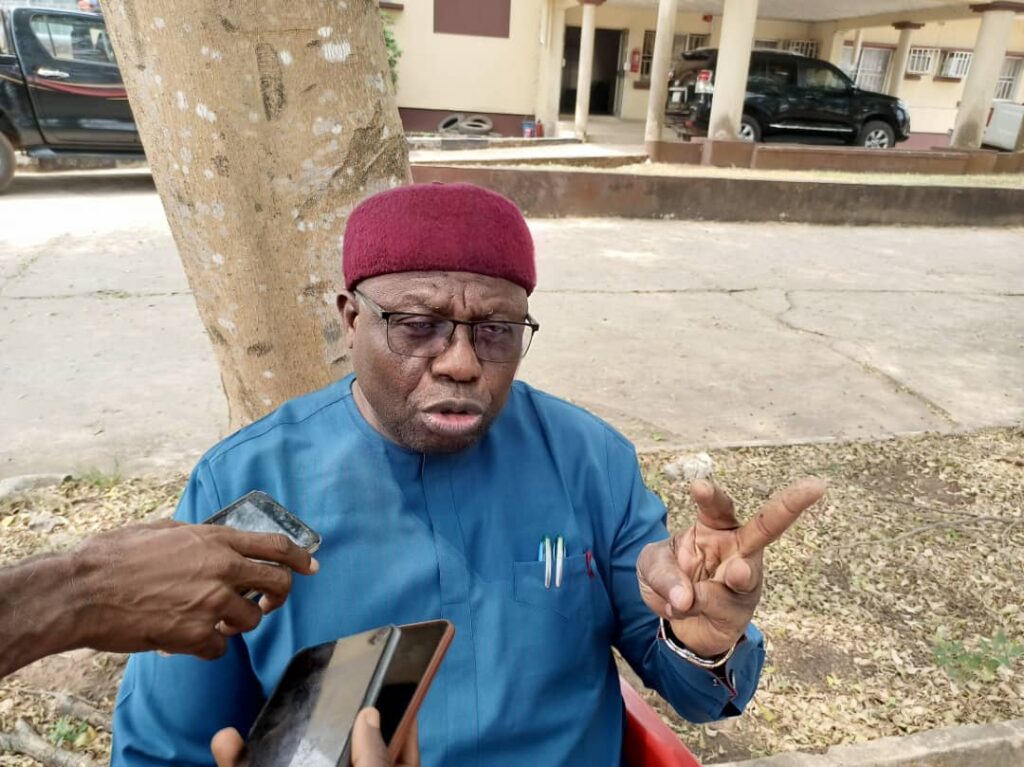Stephen Ukandu, Umuahia
Amid concerns over the negative effects of the scarcity of currency and petrol on the forthcoming polls, the Independent National Electoral Commission, INEC, has said that it has the assurances of the Central Bank of Nigeria, CBN; and the Nigeria National Petroleum Corporation, NNPC, that the commission would be availed with enough cash and fuel for its operations during the elections.
INEC National Commissioner and Head, Voter Education, Festus Okoye, who stated this Thursday while addressing newsmen in Umuahia, Abia State, said that the commission was fully ready for the polls.
He said that the commission was not envisaging any logistics challenges going by the assurances from both CBN and NNPC.
On the complaints that some voters who registered during the Continuous Voter Registration, could not access their Permanent Voter Cards, PVCs, Okoye said that the commission did not print new PVCs for people with multiple registration.
He, however, explained that the bio-data of such registrants were still in the INEC system, adding that they are to use their former PVCs to vote during the polls
Okoye said that contrary to misinformation in some quarters, PVCs issued before the 2011 general election are still valid, urging the owners to use them.
He equally debunked speculations that INEC said it would not use university lecturers as Returning Officers, dismissing such as fake news.
“INEC has never said it was not going to use university lecturers as Collating and Returning Officers. The bulk of our Presiding Officers are corps members; the bulk of our Assistant Presiding Officers are students of federal tertiary institutions in their penultimate year.
“Our Collation and Returning Officers will come from lecturers from federal tertiary institutions. We have had a meeting with Vice Chancellors of federal universities involved.”
On the movement of election personnel on essential duty including media practitioners and local election monitors, Okoye said the security agents involved in elections had been trained to be civil and courteous with them so as to avoid any obstruction of duty.
He, however, added that all election personnel on essential duty must be identified with the appropriate INEC tags.
Okoye warned that INEC would cancel the results of any polling unit where the presiding officer is put under pressure to allow over voting.
The INEC Spokesman who said the electoral umpire was fully prepared to conduct a credible election both on February 25 and March 11, asked Nigerians to repose confidence in the commission.
He disclosed that sensitive materials had been deposited in the Central Bank of Nigeria, CBN, branches in all the states while the non-sensitive materials had been deployed to all the Local Government Areas across the country.
“We are ready for this election. We have finished the training of Supervisory Presiding Officers. We are currently training the Presiding and Assistant Presiding Officers in strategic locations.
“In terms of readiness, we are ready to go. National Commissioners supervising the various states are out in states they are supervising on what we call readiness assurance.”
Okoye assured of the reliability and effectiveness of the Bi-modal Voter Accreditation System, BVAS, describing the new technology as the “game changer and the ultimate arbiter” of the forthcoming elections.
“The BVAS makes sure that the person who comes to the polling unit is a legally registered voter. It authenticates either the finger print or face of the voter to ensure that those who engage in identify theft are kept away from voting.
“The integrity of the BVAS is ensured. We carried out test on all the BVAS that were supplied, and we are sure we have the right quality of BVAS.
“Not only that, we have carried out hardware and software upgrade of BVAS, and that was what we tested during the mock accreditation exercise, and we are satisfied with the integrity of our BVAS.
“So, we have no fears whatsoever relating to what BVAS will achieve in the elections.”
He, however, urged political parties and voters to be vigilant to ensure their votes were protected.
“INEC has progressively infused technology into the electoral system to prevent pernicious human interference. But technology does not conduct elections; human beings do.
“So, we are emphasising on the integrity of BVAS operators and the integrity of the political actors themselves. If somebody does not go to the polling units to buy votes, and somebody is not willing to sell votes, there will be no issues.”
He dismissed rumours that some politicians were acquiring BVAS for the purpose of rigging the polls, saying it takes six months to one year to produce BVAS.
“It has to be configured and activated, and it’s only INEC that can do that with a code.”

